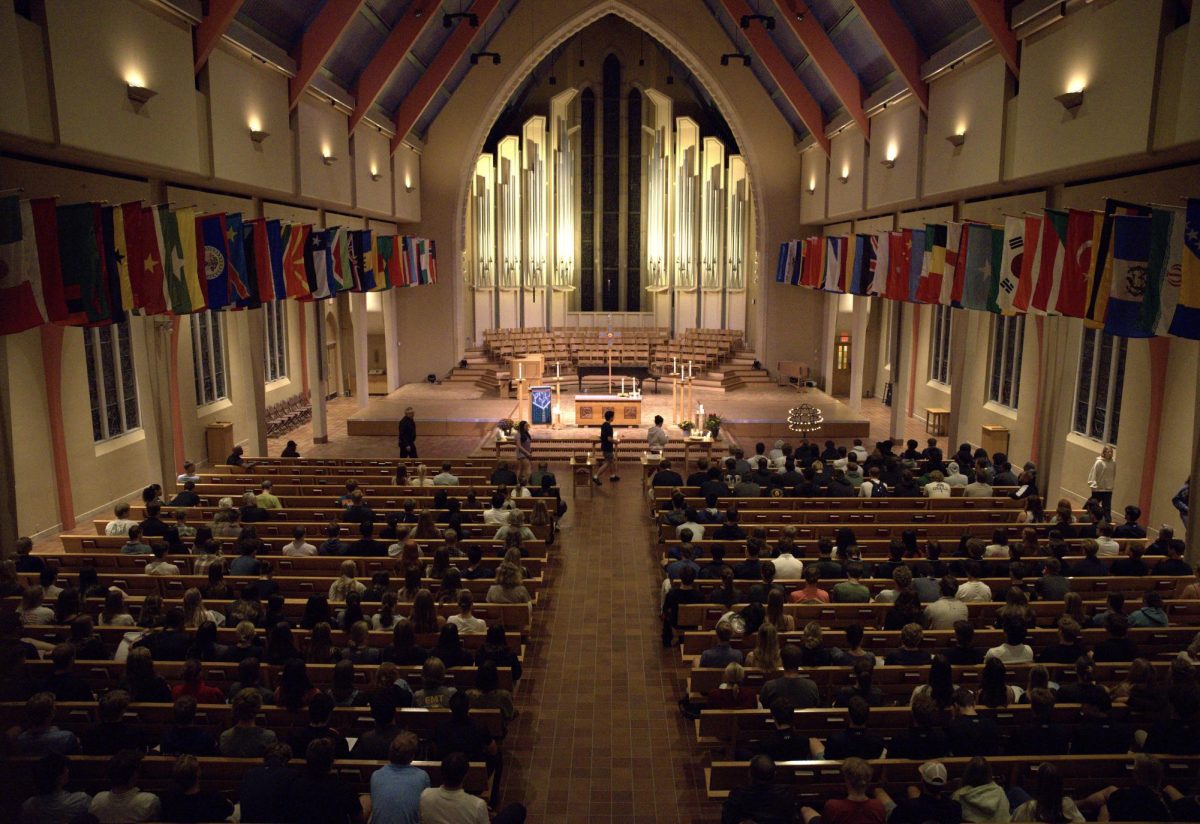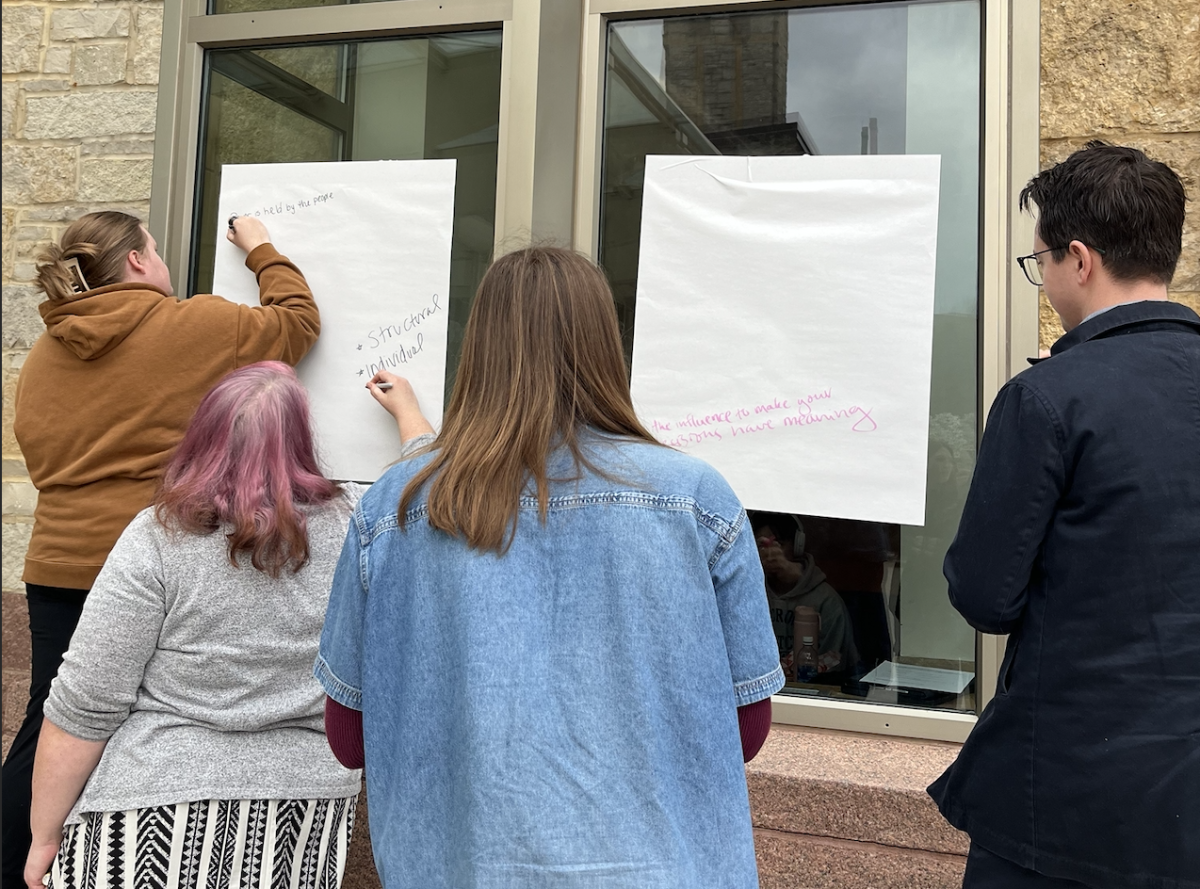On Monday, Oct. 2, students of many faith traditions gathered for an interfaith student panel hosted by the Interfaith Coalition for Peace and Justice. The event showcased the beliefs and experiences of a variety of students and encouraged a continuing dialogue about the diversity of beliefs on campus.
In the past, Interfaith Coalition has hosted separate panels for students with the same faith tradition, but this year it chose to bring people with different beliefs together.
“We really wanted to prioritize having students with a wide range of beliefs and perspectives together in the same room,” Interfaith Coalition President Kiki Sykes ’16 said. “Our primary goal of this event was to educate students about the diversity of beliefs and practices we have here at St. Olaf and to celebrate the fruitfulness that can come by bringing all these perspectives together into one shared space.”
There were 15 students on the panel: Yu Zin Htoon ’17 from the Buddhist tradition; Martine Appel ’18, Jacob Davidson ’17 and Caleb Weiss ’17 from Judaism; Henry Burt ’16 from Protestantism; Rachel Calautti ’16 from Roman Catholicism; Alice Stevens ’16 from Mormonism; Omar Shahata’ 18, Wed al-Nod’ 19 and Zareef Kamal ’18 from Islam; Smita Gurram ’16 and Karan Patel ’19 from Hinduism; Claire Zinser ’16 from Unitarian Universalism who identifies as atheist; Serena Calcagno ’17 from secular humanism and Benjamin McManamon ’17 from atheism.
The panelists shared general thoughts about their faith traditions and explained what it’s like to live out their beliefs in the St. Olaf community.
“This panel, though [it is] important to note that the panelists in no way were speaking on behalf of their traditions comprehensively, worked to engage students that might otherwise be unaware of the many unique experiences and narratives on the Hill,” Vice President Marni Kaldjian ’17 said.
One conversation that emerged centered on the importance of belief systems for personal identity. Appel said that she can walk into any temple, wherever she is, and feel welcome. Calautti said that the Virgin Mary has always been a strong female role model for her, and she feels her faith has empowered her as a woman. Gurram said that through Hinduism she feels connected to her Indian culture.
Most panelists said they feel St. Olaf is a very welcoming and accepting environment in which they can practice their beliefs. Htoon and Patel said they do have to explain their faith to people on campus a lot, but they do not mind. Calcagno pointed out that the distinctly Christian nature of choir at St. Olaf sometimes makes secular students uncomfortable.
According to several panelists, practicing a non-Lutheran faith at a Lutheran college forces students to be more intentional about how they practice their tradition. For some, this means traveling to the Twin Cities or another suburb to attend services. For others, it means having to learn to practice their faith without the support of a large community of people who practice the same thing.
A lot of students talked about the problem of large generalizations about a faith tradition. Calcagno said that she faces the stereotype that all atheists are angry people who hate religion and don’t believe in anything. She said that she lives her life through her values of truth, kindness and social and environmental responsibilities. Shehata said that people sometimes ask him questions such as “What do Muslims think about…?” Since Islam is a faith with over 1.5 billion followers around the world, he is unable to answer that question on behalf of all Muslims.
The coalition was concerned about trying to fit the stories of 15 panelists into an hour long event, but it ended up going smoothly.
“The conversations flowed pretty naturally and everyone had time to finish their thoughts before letting someone else answer. There were moments when I really wanted to ask a follow up question or have a student dive a bit deeper into some answer or response, but I think that was the point of the event,” Sykes said. “This panel was a conversation starter. Now it’s up to all of us to be accountable to ourselves and to one another that the conversation does not end there.”
The group is currently working on a project called Beliefs of St. Olaf, modeled after the popular Humans of New York project.
“We work to highlight and showcase the diversity of belief found on campus through questions that dig at the core of our personal understandings and communal relationships,” Kaldjian said.


